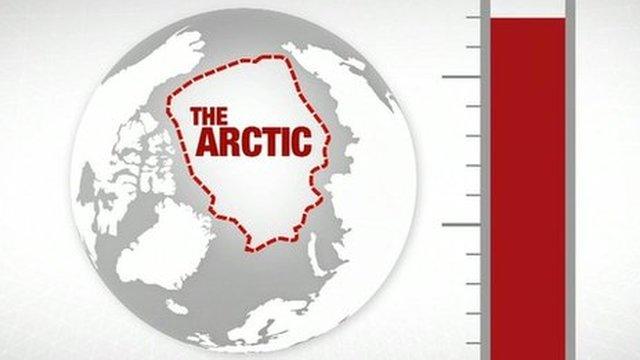COP21: Prince Charles to make forest appeal
- Published
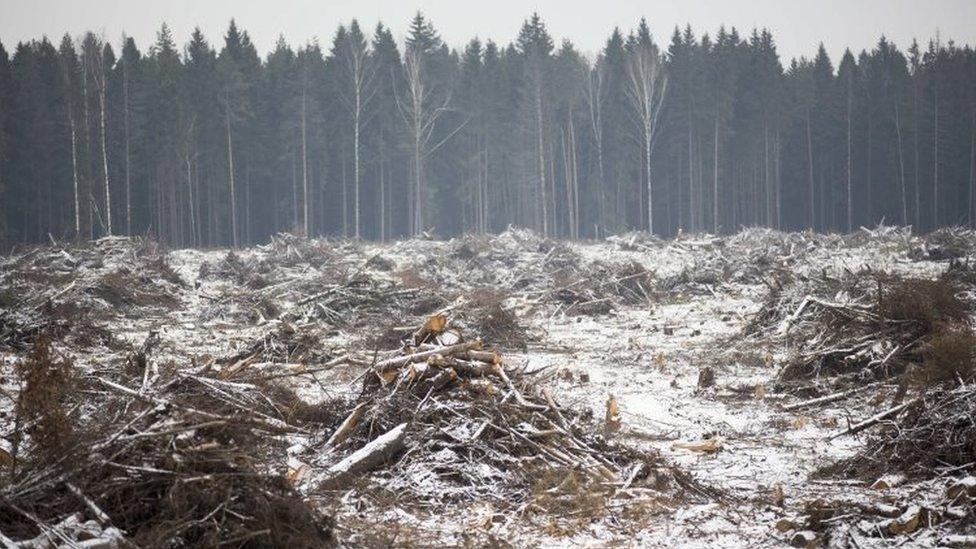
Every year about 12 million hectares (30 million acres) of woodlands are destroyed around the world
Prince Charles is expected to call for better protection of the world's forests at the UN climate conference in Paris.
He will condemn corporations which, he will argue, appear not to care if their business activities result in forest destruction.
About a billion people depend directly on forests for their livelihoods.
Negotiators from 195 nations in Paris seek to reach a deal within two weeks to reduce global carbon emissions.
The agreement is aimed at limiting global warming to 2C (3.6F).
'Cinderella' subject
On Tuesday, Prince Charles will speak at a meeting with government ministers and indigenous leaders.
The meeting is intended to promote forest partnerships in which indigenous people gain legal rights to their land and then share commercial activities.
Prince Charles tells world leaders to think of younger and as yet unborn generations when deciding what to do on climate change
The loss of forests accounts for at least 12% of carbon emissions caused by human activity, the second biggest source after burning fossil fuels, according to scientific evidence, external.
For some developing nations, deforestation is the largest source of emissions.
'New starting point'
On Monday, US President Barack Obama said the UN conference, known as COP21, could be a "turning point" in global efforts to limit future temperature rises.
He urged negotiators to deliver a meaningful deal, because the "next generation is watching".

Analysis - Matt McGrath, BBC environment correspondent, at COP21
So what can we glean from the warm words and good intentions of the leaders?
There are certainly positive omens. Leader after leader sang the same hymn - climate change is a huge challenge, only co-operation on a global level can solve it, and my country is doing great!
Still, there were obvious divisions.
Progress may or may not happen over the next two weeks.
One negotiator told me the whole idea was for the leaders to come, speak and happily be on their way without toppling this carefully constructed applecart.
Unlike in Copenhagen in 2009.
"The leaders fully understand the political nature, the political difficulties. They are coming here to provide manoeuvring guidance," he said with a hint of irony.
"And we as negotiators will then have to fix it."

Russian President Vladimir Putin also addressed the conference.
During negotiations for the preceding Kyoto Protocol, Russia was the last industrialised nation to ratify the global agreement, allowing the landmark deal to come into force in 2001.
Mr Putin said: "We have demonstrated we can ensure economic development and take care of our environment at the same time."
In a diplomatic play on semantics, probably to highlight the differing points of view between industrialised and emerging economies, Chinese President Xi Jinping told the conference he did not see the Paris talks as a turning point nor a "finish line, but a new starting point".
He also reiterated China's pledge to start cutting its emissions from a peak in 2030.
'Difficult' decisions
British Prime Minister David Cameron used his address to consider how future generations would respond to the idea that it was "too difficult" for this generation of politicians to reach an agreement in 2015.

Organisers hope the Paris talks will be a vintage year and will bear fruit
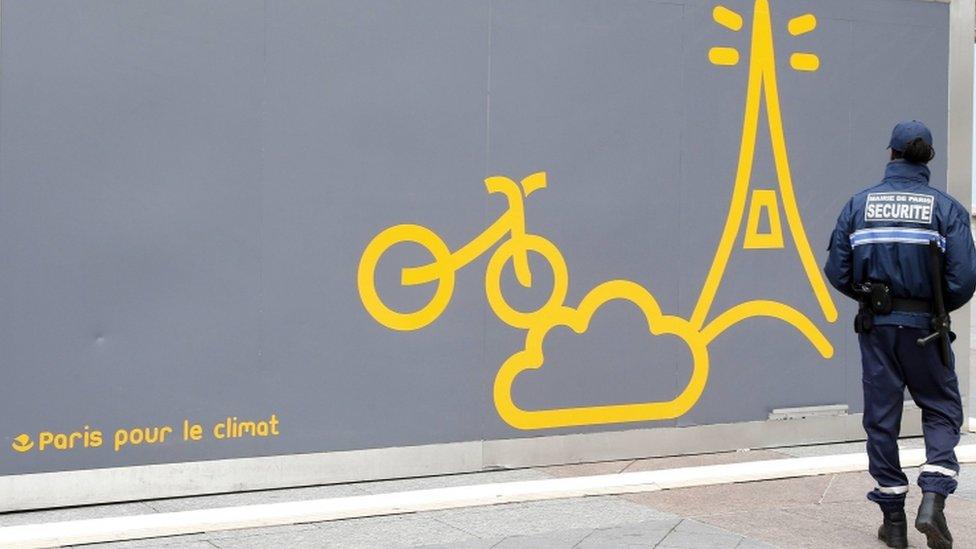
Security has been tight around the climate talks, attended by more than 150 world leaders
Tuvalu Prime Minister Enele Sopoaga made a stark observation in his passionate address: "If we save Tuvalu, we will surely save the world."
"Like other nations in the Pacific, our survival depends on the decisions we take here in Paris," he said, reflecting the concerns of many Small Island States (SISs) around the globe.
"We stand on a cliff edge. Either we stand united and agree to combat climate change, or we all stumble and fall."
World leaders are attending the start of the two-week meeting to give impetus to the talks, after the high-profile failure of the Copenhagen summit in 2009.

Key issues
Major points of contention include:
Limits: The UN has endorsed a goal of limiting global warming to no more than 2C over pre-industrial levels by the end of the century. But more than 100 poorer countries and low-lying, small-island states are calling for a tougher goal of 1.5C.
Fairness: Developing nations say industrialised countries should do more to cut emissions, having polluted for much longer. But rich countries insist that the burden must be shared to reach the 2C target.
Money: One of the few firm decisions from the 2009 UN climate conference in Copenhagen was a pledge from rich economies to provide $100 billion (93 billion euros) a year in financial support for poor countries from 2020 to develop technology and build infrastructure to cut emissions. Where that money will come from and how it will be distributed has yet to be agreed.

UN climate conference 30 Nov - 11 Dec 2015

COP 21 - the 21st session of the Conference of the Parties - will see more than 190 nations gather in Paris to discuss a possible new global agreement on climate change, aimed at reducing greenhouse gas emissions to avoid the threat of dangerous warming due to human activities.
COP21 live: The latest updates from Paris
Explained: What is climate change?
In video: Why does the Paris conference matter?
Analysis: From BBC environment correspondent Matt McGrath
More:, external BBC News special report

What are the specific goals of COP21?
The ultimate aim is to limit warming to 2C (3.6F) above pre-industrial levels, widely seen as a dangerous threshold. Since 1880, the average global temperature has already risen by almost 1C. About 0.6C of this has occurred in the past three decades.
Why does this matter?
When the Earth warms about 2C above pre-industrial times, scientists say there will be dangerous and unpredictable impacts on our climate system. And we're already half-way to that danger point.


Do you have a question about climate change? Or a question about COP21? Our correspondent Matthew Price will answer a selection of yours on 1 December in Vanuatu, South Pacific.
Send your questions for Matthew in the following ways:
WhatsApp: +44 7525 900971
Tweet: @BBC_HaveYourSay, external
Send an SMS or MMS to 61124 or if outside the UK +44 7624 800 100
- Published25 November 2015
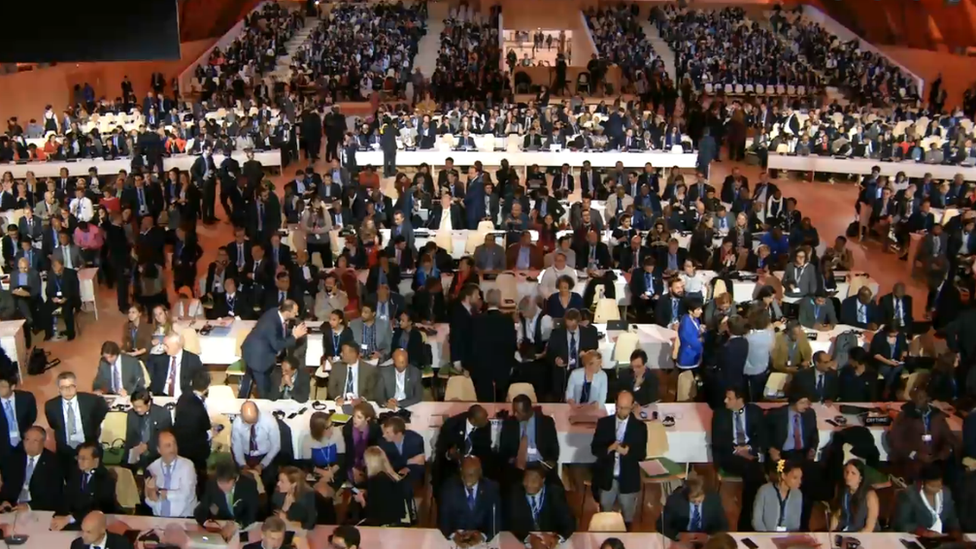
- Published30 November 2015
- Published29 November 2015
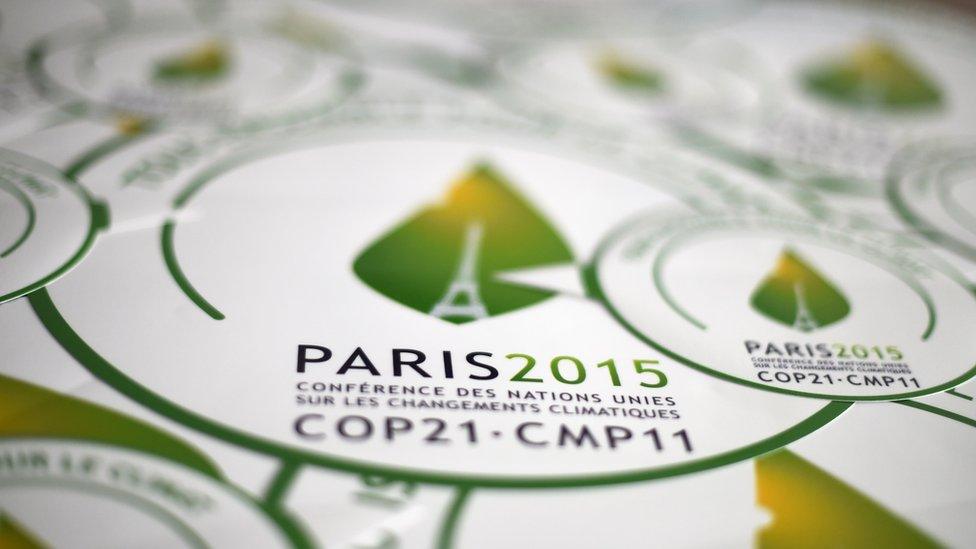
- Published25 November 2015
